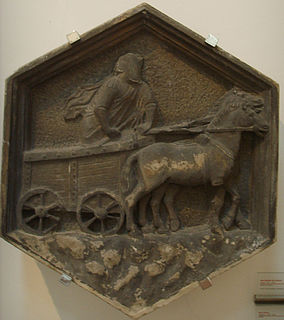Epigenes of Sicyon (Greek : Ἐπιγένης ὁ Σικυώνιος) was an Ancient Greek tragic poet. He has been confounded by some with his namesake, the comic poet.

Sicyon or Sikyon was an ancient Greek city state situated in the northern Peloponnesus between Corinth and Achaea on the territory of the present-day regional unit of Corinthia. An ancient monarchy at the times of the Trojan War, the city was ruled by a number of tyrants during the Archaic and Classical period and became a democracy in the 3rd century BC. Sicyon was celebrated for its contributions to ancient Greek art, producing many famous painters and sculptors. In Hellenistic times it was also the home of Aratus of Sicyon, the leader of the Achaean League.

Greek is an independent branch of the Indo-European family of languages, native to Greece, Cyprus and other parts of the Eastern Mediterranean and the Black Sea. It has the longest documented history of any living Indo-European language, spanning more than 3000 years of written records. Its writing system has been the Greek alphabet for the major part of its history; other systems, such as Linear B and the Cypriot syllabary, were used previously. The alphabet arose from the Phoenician script and was in turn the basis of the Latin, Cyrillic, Armenian, Coptic, Gothic, and many other writing systems.

Ancient Greece was a civilization belonging to a period of Greek history from the Greek Dark Ages of the 12th–9th centuries BC to the end of antiquity. Immediately following this period was the beginning of the Early Middle Ages and the Byzantine era. Roughly three centuries after the Late Bronze Age collapse of Mycenaean Greece, Greek urban poleis began to form in the 8th century BC, ushering in the Archaic period and colonization of the Mediterranean Basin. This was followed by the period of Classical Greece, an era that began with the Greco-Persian Wars, lasting from the 5th to 4th centuries BC. Due to the conquests by Alexander the Great of Macedon, Hellenistic civilization flourished from Central Asia to the western end of the Mediterranean Sea. The Hellenistic period came to an end with the conquests and annexations of the eastern Mediterranean world by the Roman Republic, which established the Roman province of Macedonia in Roman Greece, and later the province of Achaea during the Roman Empire.
He is mentioned by Suidas [1] as the most ancient writer of tragedy. By the word "tragedy" here we can understand only the old dithyrambic and satyrical tragôidia, into which it is possible that Epigenes may have been the first to introduce other subjects than the original one of the fortunes of origin, if at least we may trust the account which we find in Apostolius, Photius, and Suidas, of the origin of the proverb ouden pros ton Dtonuson. This would clearly be one of the earliest steps in the gradual transformation of the old dithyrambic performance into the dramatic tragedy of later times, and may tend to justify the statement which ascribes the invention of tragedy to the Sicyonians.

The Suda or Souda is a large 10th-century Byzantine encyclopedia of the ancient Mediterranean world, formerly attributed to an author called Soudas (Σούδας) or Souidas (Σουίδας). It is an encyclopedic lexicon, written in Greek, with 30,000 entries, many drawing from ancient sources that have since been lost, and often derived from medieval Christian compilers. The derivation is probably from the Byzantine Greek word souda, meaning "fortress" or "stronghold", with the alternate name, Suidas, stemming from an error made by Eustathius, who mistook the title for the author's name.

Satyr plays were an ancient Greek form of tragicomedy, similar in spirit to the bawdy satire of burlesque. They featured choruses of satyrs, were based on Greek mythology, and were rife with mock drunkenness, brazen sexuality, pranks, sight gags, and general merriment.
Michael Apostolius or Apostolius Paroemiographus, i.e. Apostolius the proverb-writer, was a Greek teacher, writer and copyist who lived in the fifteenth century.
We do not know the period at which Epigenes flourished, and the point was a doubtful one in the time of Suidas, who says [2] that, according to some, he was the 16th before Thespis, while, according to others, he almost immediately preceded him. [3]

Thespis of Icaria, according to certain Ancient Greek sources and especially Aristotle, was the first person ever to appear on stage as an actor playing a character in a play. In other sources, he is said to have introduced the first principal actor in addition to the chorus.





